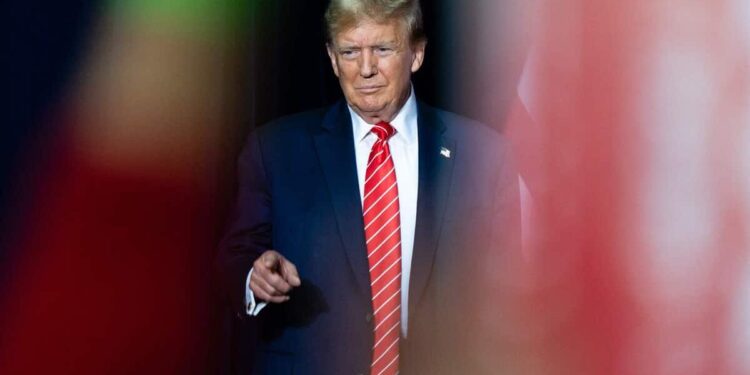Republican candidate Donald Trump defended Monday, during an interview with CNBC, his desire to impose 10% customs duties on products imported into the United States, assuring that a reduction in taxes will limit the effects for American consumers.
• Read also: Putin pins his hopes on a Trump victory
• Read also: Trump places his relatives at the head of the Republican Party
• Read also: Biden launches frontal attack on Trump in State of the Union address
“I am a big supporter of tariffs for two reasons. First of all for their economic efficiency, when other countries try to take advantage of you (…) but beyond the economic aspect, it gives you the power to negotiate with other countries,” explained the former American president.
The Republican candidate is the last in the running for the party nomination after his ultimate rival, Nikki Haley, announced that she was ending her campaign after a one-sided Super Tuesday, which saw Donald Trump win almost all primaries at stake on Tuesday.
If Mr. Trump continues to target China, he also assured that he would not spare the European Union (EU), believing that the Europeans take advantage “of us at least as much as China, but they do it with the smile”.
Responding to the fears of economists who believe that an increase in customs fees would disrupt international trade, the former president estimated that it would disrupt trade “abroad, by bringing it back to the United States.”
While American inflation is gradually approaching the 2% target set by the Federal Reserve (Fed), at 2.4% over one year in January, according to the PCE index favored by the American central bank, a Rising customs duties would lead to a further increase in prices, in the opinion of many experts.
But “I think taxes can be lowered. And I am also thinking of other things that can be done to more than offset the additional cost of these customs measures for American households, assured Mr. Trump.
During his term in office, Donald Trump sharply increased customs duties on Chinese products in order to force Beijing to negotiate a rebalancing of the trade balance between the world’s two leading economic powers.
China responded with customs duties on various American products, before negotiating an agreement allowing more products from the United States to be imported, slightly reducing the American trade deficit vis-à-vis China but without that does not really change the trade balance between the two countries.
His successor, and potential Democratic competitor for next November’s elections, President Joe Biden, has for his part chosen a policy targeting more specifically restrictions on exports of technological products to China. The American administration also favored a reduction in American investments in the Middle Kingdom.
Joe Biden at the same time put an end to the trade conflicts initiated with the EU by his predecessor, notably on steel and aluminum, at the same time favoring a policy of “friendshoring”, in order to be less commercially dependent. of China and instead rely on countries closer to the United States, both geographically and ideologically.



